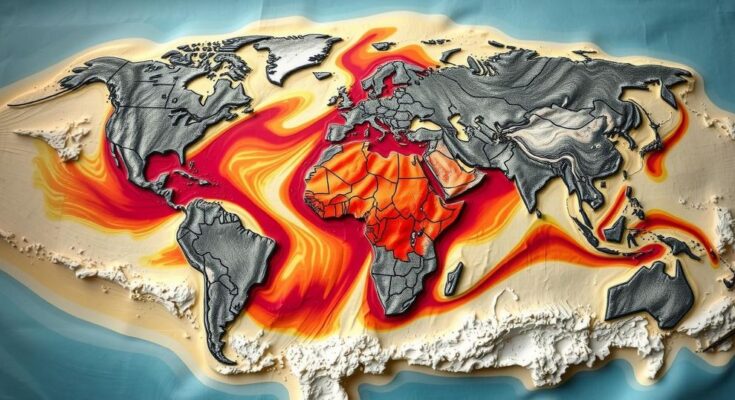This article discusses recent research indicating that climate change may be influencing earthquake frequency, particularly illustrated by a recent 7.3 magnitude quake in Vanuatu. The study from Colorado State University establishes a connection between retreating glaciers and increased fault movement, suggesting an urgent need for awareness regarding the impact of climate change on seismic activity.
Recent findings indicate that climate change may influence seismic activity, as demonstrated in a study by Colorado State University. The study suggests that the melting of glaciers, which previously exerted pressure on fault lines, could result in an increase in earthquake frequency. This phenomenon was notably highlighted by the recent magnitude 7.3 earthquake near Vanuatu, a region that is particularly vulnerable to both climate change and seismic events. Vanuatu’s Special Envoy for Climate Change and Environment, Ralph Regenvanu, emphasized the urgent need for global awareness, stating that climate change poses an existential threat that affects all nations regardless of their geographic location.
The research involved an analysis of the Sangre de Cristo Mountains in southern Colorado, where researchers observed that the retreat of glaciers has correlated with a significant acceleration in fault movement. Specifically, the slip rates along active faults have increased fivefold since the last ice age, suggesting a direct relationship between climate-induced changes and seismic activity. Cece Hurtado, the lead author of the study, pointed out the urgency of the climate crisis, noting that the rate of climate change far exceeds historical geological records. As glaciers and ice masses reduce, it becomes critical to understand the implications for fault lines and how this might influence earthquake patterns.
Understanding the nexus between climate variations and earthquake activity could enhance hazard assessments, providing crucial insights into the underlying causes of seismic events. Sean Gallen, the senior author of the study, highlighted the significance of their findings, suggesting that the connection between atmospheric changes and the solid earth is evident and measurable. This research is part of a growing body of evidence that illustrates how our changing climate may impact geological activity and emphasizes the importance of addressing climate change comprehensively and urgently.
Climate change and its implications for geological processes have been the subject of emerging research, particularly concerning seismic activity. The study conducted by Colorado State University serves to elucidate how climate variations, especially the melting of glaciers, can influence fault lines and increase earthquake frequency. This phenomenon has significant implications for regions like Vanuatu, which are not only prone to earthquakes due to their tectonic position along the Pacific Ring of Fire but are also critically vulnerable to the impacts of climate change. With the increasing evidence suggesting a connection between climate and seismic activity, understanding these dynamics is crucial for disaster preparedness and hazard assessment.
In summary, recent research indicates that climate change may be a contributing factor to the frequency of earthquakes, as evidenced by the findings from Colorado State University. The interaction between climate dynamics, such as glacial retreat, and tectonic activity sheds light on the complex relationship between environmental factors and seismic events. Notably, Vanuatu’s recent earthquake underscores the pressing need for global awareness and action regarding the climate crisis. Overall, integrating this understanding into hazard assessments could significantly enhance preparedness for future seismic events.
Original Source: www.euronews.com




